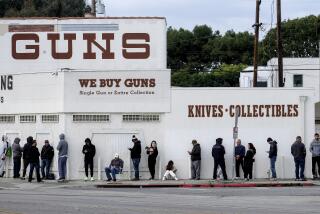Political gamesmanship
- Share via
ADD CITY ATTY. ROCKY DELGADILLO to the growing list of politicians battling to keep indecent video games out of the hands of minors -- a fight that’s sure to generate headlines, if not victories in court. Lawmakers across the country have tried to regulate the sale of blood-gushing games to minors, only to have the federal courts toss the measures out as unconstitutional. The most recent ruling came in late December from a judge in San Jose who slapped a preliminary injunction on a California law aimed at egregiously violent simulations.
Delgadillo, by contrast, targeted a specific title: “Grand Theft Auto: San Andreas” by Take-Two Interactive’s Rockstar Games. The latest in a series of wildly popular and gleefully sociopathic titles, the game went one notable step further than its predecessors: It included hidden scenes depicting virtual gangstas and their girlfriends having sex. The antics could only be “unlocked” by downloading a bit of free software distributed by a Dutch programmer.
In a lawsuit filed against Take-Two last week, Delgadillo argued that the company violated state law by marketing the game in a misleading fashion. Because Take-Two didn’t disclose the hidden scenes, the industry’s ratings board initially rated the game for “mature” audiences, not “adults only.” The latter would have hurt sales because most retailers would not have stocked the game. The board eventually upped the rating to “adults only,” prompting Take-Two to issue a new, cleaner version. By that time, however, more than 12 million copies had been sold.
Still, it’s worth noting that the modification wasn’t released until June 2005, well after the game racked up most of its sales. The industry’s ratings board may have taken its time in cracking down, but its eventual response forced Take-Two to rework and reissue the game, probably costing the company tens of millions of dollars. In addition, the Federal Trade Commission launched an investigation into whether Take-Two misled the public, and a New York grandmother filed a class-action lawsuit against the company.
Delgadillo, who is running for state attorney general, is just piling on. Beyond that, the lawsuit is absurd at its core. Does anyone believe that buyers or retailers of a video game that encourages players to murder, steal and pimp were misled because they weren’t told it contained hidden scenes of virtual sex?
Some politicians are interacting with game developers in more fruitful ways, coming up with alternatives to violent or prurient titles. A good illustration is a United Nations-sponsored video game called “Food Force.” More than 3 million players registered for the game, comparing their scores -- based on conducting air drops of food, designing nutritious meals and planning a 10-year anti-hunger strategy -- with real U.N. missions.
That’s no match for the heavily marketed “Grand Theft Auto” series. But it’s a start.
More to Read
The biggest entertainment stories
Get our big stories about Hollywood, film, television, music, arts, culture and more right in your inbox as soon as they publish.
You may occasionally receive promotional content from the Los Angeles Times.










